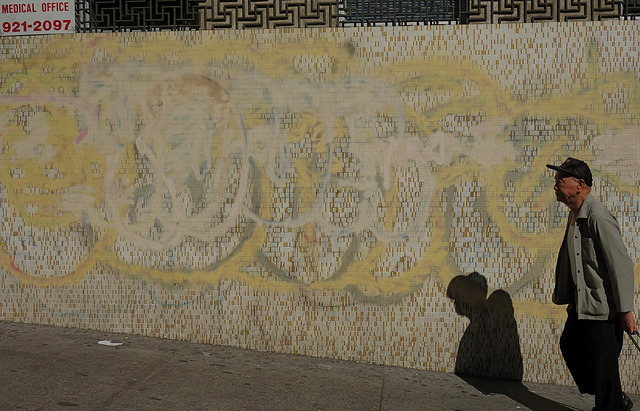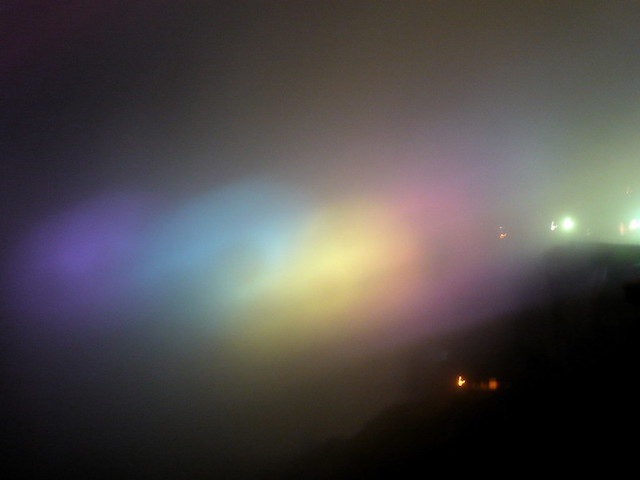With only the moonlight, we could barely see what we’d tag. All around my tag were faded names, names we didn’t bother to read in the dark—our graffiti forebears. One day, we too would be unread.

July 19, 2018
In his debut memoir, Paper Sons (Autumn House Press), Dickson Lam moves from San Francisco’s projects to Hong Kong to China, pulling together everything from the history of early Chinese immigration to the U.S., his own turbulent childhood—shaped by his father’s abandonment and abuse—to his work as a high school teacher in a low-income neighborhood. Read an interview with Lam on The Margins here.
writing crews
The first tagging crew I joined was PE, Public Enemy, named after the rap group. I’d imagined kids donned in berets and paramilitary uniforms, my generation’s Black Panthers, but the leader of PE turned out to be a short white boy. Only a month after I joined, the crew died. Most crews never made it past a year. Not due to infighting or a power struggle. Motherfuckers just got tired of their crew name, bored of having to write the same letters next to their tag.
The leader of PE started another crew, TFB, Taking Frisco Back. It was rebranding. Most of the members in PE wound up in TFB. The ones who didn’t had quit writing. It was a revolving-door community. New writers were always being birthed.
Ten months later, TFB faded away, and the core members started KSF, Kings of San Francisco. I was one of the five founding members, though I could only trace our roots back two tagging generations. We were writers who didn’t record our past.
Paper Sons
One in three Chinese Americans are using a falsified last name, though they may not even know it. Their ancestors, during the first half of the twentieth century, came here “illegally,” but that term’s misleading, suggesting an immoral ethos, when it was the law itself that was immoral. The Chinese Exclusion Act—the name says it all, the first and only time the United States explicitly banned a group based on their race. This law also blocked “legal” emigrants from China from becoming naturalized citizens, yet “illegal” emigrants from Europe were offered a pathway to citizenship. For these white undocumented immigrants, we were willing to grant amnesty, their past transgressions forgotten. Citizenship could be extended or withheld, but this choice had nothing to do with notions of legal or illegal; it had everything to do with affirming whiteness.
Like undocumented immigrants today who can only live and work in the United States by acquiring fake papers, many of the Chinese immigrants who arrived in the first half of the twentieth century also had fraudulent papers. When the 1906 earthquake and fire destroyed city records in San Francisco, Chinese living here capitalized. Many of them lied, claiming they were citizens who had lost their birth certificates in the flames. It couldn’t be disproved. Now that they were citizens, they could bring over their children—an exception to the Chinese Exclusion Act—but why stop there? For a large sum, they’d pretend to be the father of someone unrelated to them in China, signing affidavits testifying to this. Paper sons, or in rarer cases, paper daughters, would ditch their family name and adopt the surname of the sponsoring “father.” The lie of the paper children would be handed down to their offspring.
The deception, however, didn’t guarantee entry into the country for paper children, only arrival at Angel Island, not far from Alcatraz. Known as the “Ellis Island of the West,” Angel Island in reality was more of a prison: armed guards, a tall fence with barbwire. Chinese would be detained for days, months, sometimes a couple of years. Their somber stories are told through the poems they carved into the wooden walls of their barracks, rooms crammed with triple-decker bunk beds for a hundred men. One poem reads:
蛟龍失水螻蟻欺
The dragon out of water is humiliated by ants;
猛虎遭囚小兒戲
The fierce tiger who is caged is baited by a child.
被困安敢與爭雄
As long as I am imprisoned, how can I dare
strive for supremacy?
得勢復仇定有期
An advantageous position for revenge will surely
come one day.
To determine if detainees were indeed the children of the supposed father, immigration officials would interrogate them. They’d ask questions about their village, their family, the physical layout of their home, how many steps from their home to the orchard, tricky questions meant to trip up the detainee. Based on their answers, they’d either be allowed to immigrate or they’d be deported. Officials would compare the answers of the detainees with the answers they’d receive from the supposed father—a high stakes father-son version of The Newlywed Game. But the game was rigged. The imposter children had secretly been given hundreds of pages describing their supposed family, a book-length cheat sheet.
A small number of detainees were actually the real children of fathers in America, but would their answers to questions about their homeland be the same as their fathers’? Their dads hadn’t been back in years, sometimes decades. Things had changed, especially in a country engulfed in war. During the years of Angel Island’s operation as an immigration station, the Communists and Nationalists were waging a civil war, and in the middle of that, the Japanese invaded. Poh Poh, my grandmother, had her village thrown into chaos. When she heard the gunshots, she grabbed her younger brother and ducked into the fields. As they hid, she had to keep her hand over her brother’s mouth, fearful that the Japanese soldiers could hear the muffled screams.
Too much was at stake. I suspect the real children of fathers were also given a study book to prepare for their interrogation. Answering the official honestly wasn’t the goal; answering the same as their father was. Even sons and daughters by blood played a game of pretend, trying to outtrick the trickster. Every Chinese making it through Angel Island was escaping war in their homeland, but for the actual children of fathers in America, entry into the US meant not just escape, but a reunion, an end to the years living without their fathers who they might’ve been meeting for the first time as adults. They’d uncover what kind of men their fathers actually were.
roots
The Angel Island poem was translated by Genny Lim and Him Mark Lai. Him Mark was known as the father of Chinese American history, a self-taught scholar who the FBI kept tabs on during the McCarthy era. His father was a paper son, among the first shipload of immigrants detained at Angel Island, Lai a paper name, but Him Mark’s father also managed to hide the family’s true name as the middle name of his children; Maak became Mark.
I met Him Mark through my participation in a summer program he co-founded, In Search of Roots. The program took ten Chinese Americans back to their family’s ancestral village. As part of our preparation for the trip, we met as a group on Saturday mornings, and one Saturday Him Mark stopped by and gave each of us a packet containing background info on our villages, research he’d compiled and translated.
When we arrived in the villages, folks would ask what we were doing there. Many of us spoke poor Chinese, so all we could offer was the name tags hanging around our necks. It displayed our Chinese names and our purpose: 尋根, In Search of Roots.
I journeyed to my mother’s village in the Pearl River Deltaregion of Guangdong Province, Bah Ba’s village too far for the program. I met my grandfather’s older sister, my Goo Poh. I was filming her on a camcorder, but she didn’t realize what the device was doing until I flipped the screen so she could see herself. She lived alone in a small house made of bricks. She had one daughter but hadn’t seen her in years. The daughter knew she was adopted and no longer felt an obligation to Goo Poh. “Tell my brother to come see me,” Goo Poh said. “I’m an old woman.”
I paid respects to my mother’s grandfather, my Tai Gung. He was kept in a mausoleum. Originally, he’d been buried behind the village, where family members could go and pay respect by burning sheets of paper, ghost money. Tai Gung’s body, however, had been excavated to make room for the landscaped garden of a new housing development. The economy, I was told, was booming. On top of where Tai Gung’s body had been buried was now a manicured bush.
ghost yard
We were the only ones in the Ghost Yard that night. No security guards. Just us and a fleet of dilapidated city buses. I stepped inside one, marker in hand. The scene was apocalyptic: holes in the floor, windows smashed, a seat uprooted lying sideways as if the Hulk had thrown it in a tantrum.
We found lead pipes and swung them at windshields, cracking them. We climbed onto the roofs of buses, hollering at the moon: “Errrrrayyyyyy!”
With only the moonlight, we could barely see what we’d tag, though I could feel the tip of my marker against the surface of the bus, wiping away layers of dirt and dust. All around my tag were faded names, names we didn’t bother to read in the dark—our graffiti forebears.
One day, we too would be unread.
erased
We introduced ourselves to another writer by asking, “What do you write?” Though we understood our writing had no future, we knew nothing as sweet as mobbing deep, going to work on a bus with the urgency of a pit stop crew, filling the inside of the bus with our tags, as if it were an autograph page of a yearbook—rocking it. The only thing better was seeing the same bus again, our names floating by, more points on the scoreboard. If the bus was stopped at a light, we’d marvel at our work from the sidewalk, sometimes running across the street just to get a peek. A moment had been captured, marking a particular occasion, an opening for a story: Oh, that was when—
How long a bus would run in its current graffitied state was unpredictable. Some tags lasted months. Others half a day. The more we crushed a bus with our tags, the more likely the cleanup crew at the bus yards would take notice and buff away our tags sooner rather than later. Though none of us wanted to see our names erased, we relied on buses to get buffed. Without the removal of prior graffiti, we’d have no space to tag. To write was to accept your own erasure.
This excerpt is reprinted from Paper Sons by Dickson Lam. Copyright © 2018 by Dickson Lam. Used with permission of the publisher, Autumn House Press. All rights reserved.



